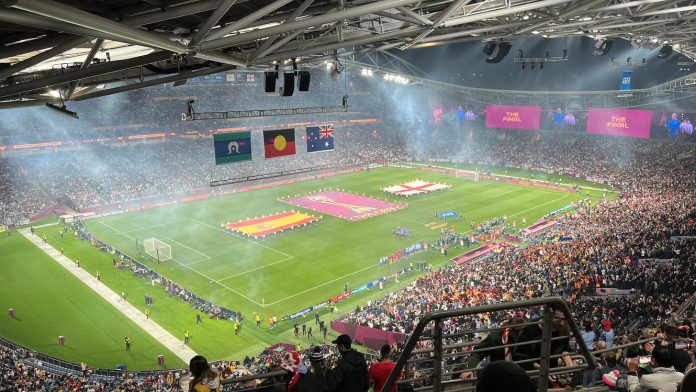Helen Pattison, West London Socialist Party and women’s football fan
This World Cup was a turning point for women’s football. By the end of the quarter finals, all previous World Cup winners had been ousted – evidence that the game is reaching a new level in many countries.
But like all sporting events run for profit, different companies put their profit interests first.
Just look at last year’s men’s Champions League final in Paris – huge problems with the treatment of fans getting into the stadium (see ‘Eyewitness: Champions League final – lying Uefa, politicians and brutal police to blame’). Or the controversy around the 2022 men’s World Cup being awarded to Qatar (see ‘FIFA can’t stop World Cup politics seeping through’).
Sexism
During a women’s World Cup, other topics get discussed too – sexism, harassment and proper support for the game.
The winners, Spain, have made headlines. Not just because of their skills on the pitch, but because the president of Spain’s football body, Luis Rubiales, grabbed a player’s face and kissed her on the lips without her consent.
Both women and men from the game have protested and gone on strike against Rubiales’s actions (see ‘Outpouring of opposition to sexism in Spain, football and society).
And there was the cringe-worthy speech by the president of football’s governing body Fifa, Gianni Infantino. He told women to pick the right battles – i.e don’t put demands on the extremely wealthy Fifa, which is also mired in corruption scandals.
Football authorities have not only failed to support the development of the women’s game. They, at times, actively blocked it. Women’s football was banned in Britain by the Football Association between 1921-71.
Shots of the audience during Infantino’s speech show a number of women looking stony-faced, after decades of fighting for the funding and support their sport needs.
The women’s game is in transition. The World Cup broke records, and not just for women’s football.
England’s Mary Earps became the second-ever goalkeeper to save a penalty, in regular time, in a World Cup final. This shows the potential of players.
Yet, football kit manufacturer Nike refused throughout the tournament to make replica shirts for any of the keepers. It was only after Earps won the golden glove, and a huge petition piled on the pressure, that Nike has now made a U-turn.
This is despite record-breaking sales. More ‘Matilda’ shirts have been sold this year than of the Australian men’s team during the Qatar World Cup.
Profit
Decisions about printing shirts, which stadiums games are played in, sponsorship deals, and wages, are all made on the basis of companies wanting to ensure easy and maximum profits.
Capitalism, as a system, perpetuates sexism, oppression and inequality. Big business will also exploit opportunities to profit from the women’s game. And it can’t offer us any arena, sporting or otherwise, which won’t also be impacted by sexist ideas.
That said, there is clearly renewed vigour among women’s football fans to fight for recognition, funding and support. As well as challenging sexism and harassment when it comes up.
Just six months ago, the government was forced by campaigning from players and fans to commit to ensuring equal access to football for both boys and girls in schools. But this same Tory government has stood over a growing economic crisis and imposed mass austerity.
How can we trust a government which expects schools to run on a shoestring to now give any child decent access to sports? Any pay rise that education workers need, for example, is supposed to come out of existing budgets.
Girls and boys equally being allowed to kick a ball on a neglected sports field won’t fix the problem. That’s why even the issue of access to sport in education is linked to fighting for an independent working-class political alternative to both the Tories and pro-austerity Labour under Keir Starmer, and for socialism.
A discussion is happening about where women’s football is heading. The men’s game has its own controversy – ticket prices soar, and working-class fans are priced out.
Fans
No doubt, many fans of the England men’s team feel that Gareth Southgate’s £5 million package is worth every penny, if it means a chance of winning. But profit has also taken power out of the hands of fans, supporters and the community, and given it to the profiteers.
To ensure genuine access to football, for kids at school, to lifelong fans, and everything in between, means we have to fight to reclaim the game. We need democratic control of football clubs by trade unions, fans and the wider community.
And we need to fight for more resources too, so we can ensure access to pitches and other sporting facilities. As well as ensuring the games themselves are accessible to all who want to attend.
Big business has no interest in this. By kicking big business out of sport, these steps can be taken, and women’s football can thrive.








